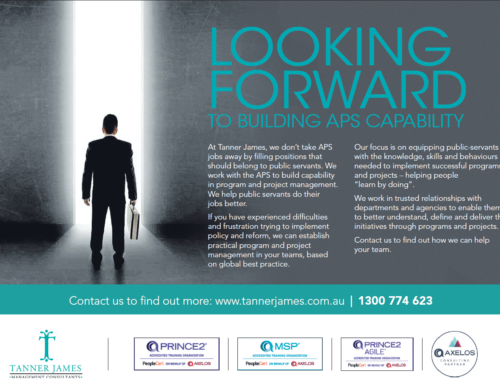Thousands of people undergo project management training every year in Australia. They sit in a classroom or undertake online learning and attain a qualification. If you are one of those people, the interesting question is: what happens when you leave the classroom?
In the beginning
Before looking at what happens after a newly qualified person leaves the classroom, we should look at what happens before they enter the classroom.
The first question to ask is “Why is this person on a project management training course?” Here are some of the responses that we often hear:
- I am a contractor and I will be able to charge more if I am qualified in PRINCE2;
- I have just been asked to run a project and I know nothing about project management;
- we have a big government reform to do and the department uses PRINCE2;
- I did a course years ago and this is a refresher;
- I will be leaving my job soon and a project management qualification will help me; or
- my boss sent me.
These are all perfectly reasonable statements, but none are much use to the training provider. Things need to be much clearer if the trainer is to deliver on the expected learning outcomes. My tip here is to remember that the trainee is not the only party involved – the person paying for their training, e.g their employer, and the training provider should all be clear about the expected learning outcomes.
So if you are a trainee, please sit down with your employer and ask them what it is you are expected to be able to do upon completion of the project management training and make sure someone has conveyed this to the training provider.
The myth of the five-day miracle
Person with zero project management experience enters classroom on Monday morning at 9am. Same person exits classroom on Friday afternoon at 5pm fully equipped to run any project.
Really?
No, but that is the myth of the five-day miracle: someone can be turned into a project manager in just five days. I have been involved in project management for over 25 years and I still have plenty to learn. So no-one is going to walk into a classroom with little or no project management knowledge and walk out with nothing else to learn.
What should I be aiming for?
So what is a reasonable goal for, say, a five-day course? That goes back to the question of “Why is this person on a project management training course” and also what experience and knowledge they already have. So the answer must be an individual one. However, there are general outcomes that are common to most project management trainees which can provide a useful starting point, for example:
- the ability to determine what should, and what shouldn’t, be managed as a project;
- an understanding of the structure and elements of a specific project management approach (e.g. PRINCE2, PMBOK).
- an appreciation of the need to tailor the approach to suit the nature and context of a specific project. Note: the trainee is unlikely to be equipped with the ability to do this without assistance;
- an understanding of the roles involved in managing a project and the responsibilities associated with the role they will personally fulfil; and
- an action plan for what they will do post-course to translate their learning into the workplace.
This last point is probably the most important. My recommendation is that this is considered before the training course and not during the course – or worst of all, after it. This is where the trainee can look to their employer for support and guidance with such questions as:
- which project(s) will I be expected to apply the learning to when I return to the workplace?;
- what will my role be on the project(s)?’;
- are there specific project management processes and/or deliverables which I am expected to follow/deliver? Are there any deadlines associated with them?;
- how much time do you expect me to spend applying my new project management skills?;
- who will be available to support me if I need assistance?; and
- what are you hoping will change once I have undertaken my training and start to apply it?
Back in the workplace
Your action plan should from the basis for translating your learning into the workplace, and with the right involvement of your employer before the training, you should be set for success.
To execute your action plan you will need to set aside time for post-course reflection, practice, discussion with others and further learning. Make sure you are disciplined with the use of this time because the old adage applies: “use it or lose it”, which is not something you want to happen with your new project management skills.






Leave A Comment